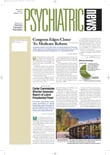Powerful new evidence that major mental disorders in young adulthood are often preceded by psychopathology in youth was found in a study conducted by British, American, and New Zealand scientists and reported in the July Archives of General Psychiatry.
Some of the associations that were found one might expect—for instance, that a young adult with anxiety was anxious in childhood, or that a young adult with depression was depressed as a youth.
But some of the other results are more surprising—for example, that a young adult with schizophreniform disorder may well have experienced anxiety, depression, or attention-deficit/hyperactivity disorder as a youth.
Yet undoubtedly the most surprising finding is that young adults with various types of mental disorders, not just antisocial personality disorder, may well have engaged in conduct or oppositional behavior as a youngster.
In 1972 a longitudinal investigation of the health and behavior of some 1,000 New Zealanders was launched. It was called the Dunedin Multidisciplinary Health and Development Study. The subjects were diagnosed for various psychiatric disorders, according to DSM criteria, at ages 11, 13, 15, 18, 21, and 26. By the time the subjects reached age 26, psychiatric disorder data had been collected for 976 of them.
Julia Kim-Cohen, Ph.D., of the Institute of Psychiatry in London, England, and colleagues decided to scrutinize these data to learn how many of the subjects who had a psychiatric disorder at age 26 had also had one at an earlier age, and if so, at what age and what kind.
By the time the 976 subjects reached age 26, the researchers found that 470 (48 percent) had been diagnosed for one or more psychiatric disorders within the previous 12 months. The disorders included generalized anxiety disorder, obsessive-compulsive disorder, posttraumatic stress disorder, panic disorder, agoraphobia, simple phobia, social phobia, major depressive episode, dysthymia, manic episode, anorexia nervosa, bulimia nervosa, alcohol dependence, marijuana dependence, other drug dependence, schizophreniform disorder, and antisocial personality disorder. (The researchers did not indicate in their report why so many of the subjects had such psychiatric disorders at age 26, except to say that the disorders in question tend to peak in young adulthood.)
What’s more, some 75 percent of the 470 subjects had received a psychiatric diagnosis before age 18, and 50 percent had between ages 11 and 15, strongly implying that psychiatric difficulties in young adulthood are often preceded by psychiatric difficulties in youth.
Further, adult psychiatric disorders were often preceded by their juvenile counterparts, which was not surprising. For example, about one-third of persons with an anxiety disorder at age 26 had had the same disorder between ages 11 and 15.
However, adult psychiatric disorders were also sometimes heralded by juvenile psychiatric disorders of other types, which was less expected. For example, of those with a manic episode at age 26, 3 percent had had attention-deficit/hyperactivity disorder between ages 11 and 15; of those with an anxiety disorder at age 26, 8 percent had had ADHD between ages 11 and 15; of those with a depressive disorder at age 26, 30 percent had had an anxiety disorder between 11 and 15; and of those with schizophreniform disorder at age 26, 32 percent had had a depressive disorder between 11 and 15.
And many kinds of adult psychiatric disorders, not just antisocial personality disorder, were found to have been preceded by conduct disorder or oppositional defiant disorder. For example, of those who had an anxiety disorder at age 26, 28 percent had had a conduct or oppositional defiant disorder between ages 11 and 15; of those who had a substance use disorder at age 26, 38 percent had had a conduct or oppositional defiant disorder between 11 and 15; of those who had schizophreniform disorder at age 26, 40 percent had had a conduct and/or oppositional defiant disorder between 11 and 15; of those who had an eating disorder at age 26, 46 percent had had a conduct and/or oppositional defiant disorder between 11 and 15; and of those with antisocial personality disorder at age 26, 60 percent had had a full-blown conduct disorder as a youngster. (Conduct disorder symptoms before 15 years of age are required for the diagnosis of antisocial personality disorder, but a diagnosis of conduct disorder is not required.)
Alan Felthous, M.D., a professor of forensic psychiatry at Southern Illinois University School of Medicine, told Psychiatric News that he found this study “fascinating.” The results, he said, “underlie the importance of directing ample clinical resources to disturbed youth [and] including a history of childhood mental and behavioral problems” in the diagnosis of adult mental disorders. And, he added, “I think there are some fascinating possibilities for future research that can take off from these findings. For instance, in looking at the history of conduct or oppositional disorder in childhood and later antisocial personality, taking into account its association with other disorders too, is there something specific about conduct disorder that is more closely associated with antisocial personality disorder?”
The study was funded by the New Zealand Health Research Council, National Institute of Mental Health, William T. Grant Foundation, U.K. Medical Research Council, and a Royal Society-Wolfson Research Merit Award.
Arch Gen Psychiatry 2003 60 709
